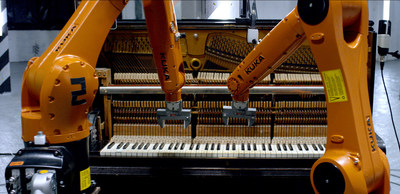TechCrunch Premieres Nigel Stanford's Next Mini-Movie "Automatica - Robots vs. Music"
Robotics Meets Music In New Groundbreaking "Mini-Movie" As Stanford Raises Tech/Dance-Pop Interface to Astounding Heights
Automatica Album Released Today
09/15/2017
NEW YORK, Sept. 15, 2017 /PRNewswire/ --

Automatica is the title-track from Stanford's forthcoming Sony Music Masterworks debut album. "Automatica - Robots vs. Music" is a follow up to 2015's viral video, "Cymatics – Science vs. Music" which visualized a brand-new synthesis of music, art and physics. Stanford's latest brainchild raises the question, just how close are we to fully AI robots performing instruments and blending in with normal, every-day human activity? Watch his latest creation today on TechCrunch.
It was in early 2015 that he came up with the idea of following up the huge success of "Cymatics" by programming robots to play instruments – keyboards, bass, drums – on the "Automatica" single, his next groundbreaking "mini-movie." With robots from KUKA Robotics, animation software to program them, and support from high-end microphone firm Sennheiser, he retired to his garage for a month to program and position the robots to play the music. Looking at the video, you'd think it took a whole team of engineers and programmers, but you'd be wrong. "I do all of the programming," Nigel says. "I think it's important to come at the scientific aspects from the perspective of a Musician."
ABOUT NIGEL STANFORD:
Born and raised in New Zealand, Nigel Stanford began learning piano as a child, picked up a guitar at 14, commenced playing in bands, got into electronic music, and eventually determined that it was easier to go solo. Always interested in the relationship between music and science, and always visually oriented – "I'm the kind of guy who goes to a concert and watches the drummer" – he began experimenting with various ways of visualizing sound waves. He also believes he has a mild form of synesthesia – in his case, perceiving sounds as colors, bass frequencies being red, high-end frequencies being white and yellow. So the field of cymatics – the science of visualizing audio frequencies – was a natural fit for his unique creative spirit.
NASA and the European Space Agency have both used music from his first album, 1999's Deep Space. In line with his visual POV, in 2008 he co-produced the film Second Hand Wedding, which became a No. 1 box office hit and the 7th highest-grossing New Zealand movie ever. In 2012 he produced and wrote the soundtrack for the documentary TimeScapes in collaboration with famed photographer Tom Lowe. His 2014 album Solar Echoes introduced the viral video hit "Cymatics" (over 15 million hits on YouTube and Vimeo, and another 45 million on Facebook) which helped push the album onto the Billboard Dance and Electronic charts. Wired, Colossal, Discovery Channel, BBC, Gizmodo, and the front page of Reddit all featured "Cymatics." Currently Nigel spends his time living in Wellington, New Zealand and New York.
Sony Music Masterworks comprises the Masterworks, Sony Classical, OKeh, Portrait, and Masterworks Broadway imprints. For email updates and information please visit www.portraitrecords.com.
Media Contacts:
Angela Barkan, angela.barkan@sonymusic.com, 212-833-8575
Larissa Slezak, larissa.slezak@sonymusic.com, 212-833-6075
www.sonymasterworks.com
nigelstanford.com
SOURCE Sony Music Masterworks